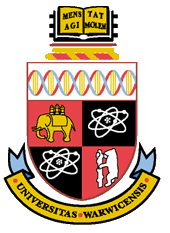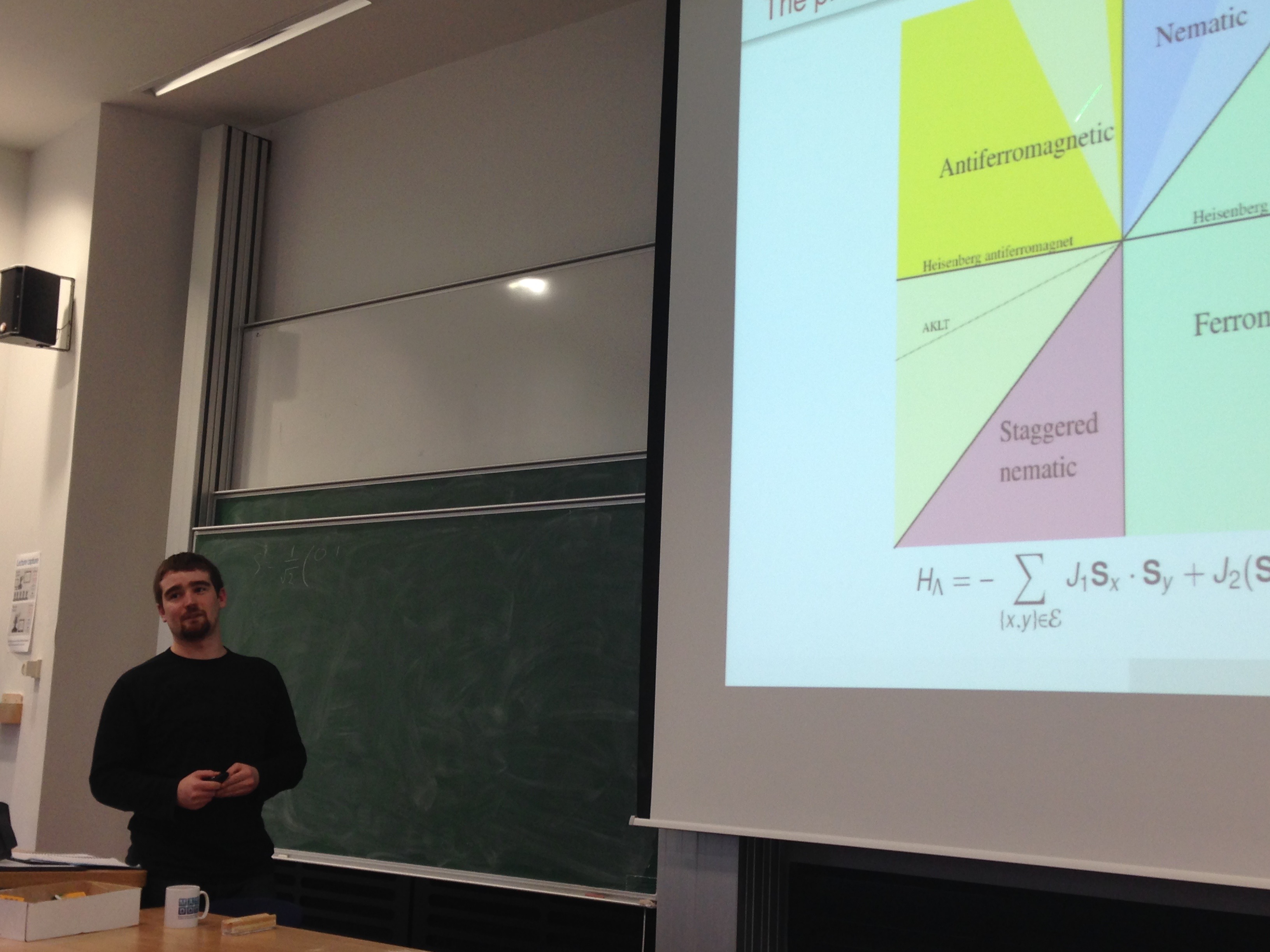Warwick Statistical Mechanics Seminar
in the Department of Mathematics
 |
This term, all seminars take place Thursdays at 2pm, room MS.04 (Zeeman Building), unless indicated otherwise. |
 Ben Lees, 03.12.2015 |
| 26.04.2018 | |
| 03.05.2018 | |
| 10.05.2018 | |
| 17.05.2018 | Andre Schlichting (RWTH Aachen) Macroscopic limits of the Becker-Döring equation via gradient structures In this talk, we consider evolution equation with a gradient structure. That is, the evolution is obtained as gradient flow of a free energy with respect to some metric. We review a variational framework, which allows passing to the limit from one gradient structure to another. In particular, we apply the method to gradient structures of a discrete coagulation-fragmentation model, the Becker-Böring equation, and its macroscopic limit in the form of a non-local conservation law. We show that the convergence result obtained by B. Niethammer (J. Nonlinear Sci.) can be extended to proof the convergence not only for solutions of the Becker-Döring equation towards the Lifshitz-Slyozov-Wagner equation of coarsening but also the convergence of the associated gradient structures. If time permits, we will outline how the variational structure may be able to quantify the rate of the convergence of gradient structures. |
| 24.05.2018 | Giovanni Peccati (University of Luxemburg) Limit theorems for Gaussian random waves I will discuss several limit theorems characterising the high-energy fluctuations of geometric quantities (such as nodal lengths and nodal counts) associated with Gaussian random waves - with specific emphasis on the planar, arithmetic and spherical cases. Our techniques are based on a pervasive use of Wiener-Itô chaotic expansions, as applied to limit theorems and probabilistic approximations: in particular, we will show that the use of Wiener chaos fully explains some remarkable cancellation phenomena for variances of nodal quantities, first discovered by M. V. Berry in 2002 in the framework of planar random waves. Based on several joint works (some ongoing) with F. Dalmao, G. Dierickx, D. Marinucci, I. Nourdin, M. Rossi and I. Wigman. |
| 31.05.2018 | James Martin (University of Oxford) Recursive structures in multi-type exclusion processes Consider a system of N particles with labels 1,2,..., N jumping on a ring of size N. Each of the N sites contains a single particle. Whenever particle i is immediately to the right of particle j with i < j, the two particles exchange places at rate 1. I will review various descriptions of the stationary distribution of such "multi-type totally asymmetric simple exclusion processes", for example in terms of outputs of systems of Markovian queues in series, or in terms of traces of matrix products. Suppose we now add jumps in the reverse direction (i.e. when particle i is to the left of particle j for i < j) with some rate q in (0,1). I will describe how the constructions above generalise to this "partially asymmetric" case. A new queueing description has various nice consequences, both algebraic (e.g. a common denominator for the stationary probabilities of the various configurations as rational functions of q) and probabilistic (descriptions of the formation of "convoys" of nearby particles with similar labels for large N). If time permits I will mention some other variants (zero-range processes, Busemann functions for last-passage percolation) and some open problems. |
| 07.06.2018 | Nick Simm (University of Sussex) Moments of random matrices and Wilson polynomials I will discuss a new perspective on moments of n x n random matrices X_{n}. Specifically, we consider moments E Tr(X_{n}^{-s}) for a complex variable s and completely describe the analytic structure. Several new features are revealed, including a functional equation, zeros on a vertical line ("Riemann hypothesis") and orthogonality relations. These are a consequence of a remarkable polynomial property of the moments, related to orthogonal polynomials of Askey type (e.g. Meixner, Hahn or Wilson). This is joint work with Fabio Deelan Cunden (UCD), Francesco Mezzadri (Bristol) and Neil OConnell (UCD): arxiv.org/1805.08760 |
| 14.06.2018 | |
| 21.06.2018 | Ines Armendariz (University of Buenos Aires) Poisson gas of loops and interlacements Spatial random permutations are known to be related to Bose-Einstein condensation since the work of R. Feynman in the 50s. In a first result, we show that at high enough temperature there is no condensation for the quenched model: for almost all realizations of the point process the associated measure is supported on finite cycle permutations. Next, we propose an annealed model for the infinite volume random permutation, at both subcritical and supercritical regimes, such that infinite cycles are present only in the condensate phase, as expected. We show that the configuration of points from the random permutation coincides with the previously and independently studied physical point process. This is joint work with P. Ferrari, N. Frevenza and S. Yuhjtman. |
| 28.06.2018 | Antonio Moro (Northumbria University) Shock dynamics of phase diagrams: Maxwell relations, collective phenomena and integrability A phase transition denotes a drastic change of state of a thermodynamic system due to a continuous change of parameters. Inspired by the theory of nonlinear conservation laws and shock waves we develop an approach to phase transitions based on the solution of Maxwell relations. This theory provides an exact mathematical description of discontinuities of order parameters and phase transitions via integrable hierarchies of PDEs, it allows to classify universal classes of equations of state and interpret the occurrence of critical points in terms of the dynamics of nonlinear shock wave fronts. The approach is shown at work in the case of mean field magnetic and fluid models, nematic liquid crystals and random graphs. SPECIAL TIME AND PLACE: 16-17 in MS.05. |